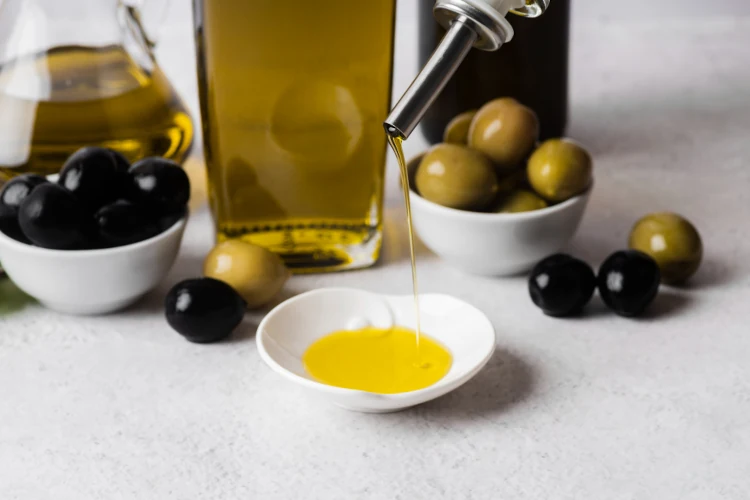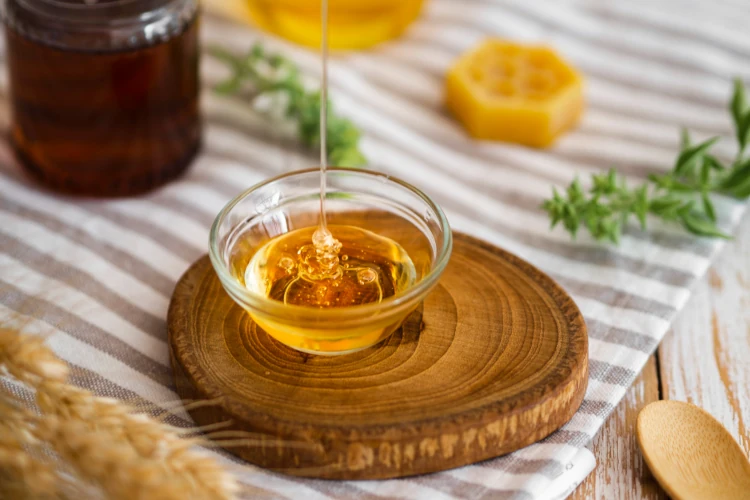Qur’an:
“[I swear] by the fig and the olive.” (Qur’an 95:1)
“And [We brought forth] a tree issuing from Mount Sinai which produces oil and relish for those who eat it.” (Qur’an 23:20)
“And He it is Who causes gardens to grow, [both] trellised and untrellised, and palm trees and crops of different [kinds of] food and olives and pomegranates, similar and dissimilar. Eat of [each of] its fruit when it yields and give its due [zakāh] on the day of its harvest. And be not excessive…” (Qur’an 6:141)
Prophet Muḥammad (S):
“Consume olive oil and apply it to the skin, since there is cure for seventy diseases in it, one of which is leprosy.” (Abu Na’īm)
“There is olive oil for you- consume it, massage it over your body, since it is effective for hemorrhoids.” (Ibn Al-Jawzī)
How to Use:
There are an amazing 130 varieties of olives, with both the olives and their oils having therapeutic benefits. The olives only have about 20% fat, while the oil is 100% fat, containing beneficial amounts of omega 3,6, 7, and 9. Raw olives are often very bitter, so they are usually cured in a lye solution and saltwater brine. When using olive oil, select extra virgin, cold-pressed type that minimizes exposure to light, heat, and air and is not genetically modified.
It is a common misconception that olive oil is completely destroyed by cooking. However, it is true that deep-frying for long periods of time can damage its antioxidants and produce harmful compounds like lipid peroxides and aldehydes. Olive oil that is lightly cooked or at room temperature is arguably the most healthy type of oil in existence.
Typical dosages for cooking with olive oil are anywhere from 1 tsp to 3 tbsp. For actual olives, limit your daily intake to 16-24 pieces depending on your health and the size and type of olives. Consult with your physician before using for your particular condition.
Benefits:
- Benefits heart disease, reduces the risk for stroke, decreases LDL cholesterol, increases HDL cholesterol, decreases blood pressure.1
- Reduces risk for type 2 diabetes.2
- Anti-cancerous3; anti-inflammatory.4
- Improves cognition, reduces the risk of Alzheimer’s.5
- Beautifies and nourishes skin.6
- Benefits rheumatoid arthritis by reducing pain, inflammation, and autoimmunity.7
- Very Rich in polyphenol and quercetin antioxidants, Vitamin E, iron, calcium, copper, and oleic acid
A summary of overall benefits are found in “Living Forever with Olive Oil” and healthline.com.8 There are more than 5,000 published studies related to olives and olive oil in the Pub Med research database!!!
References:
1. Schwingshackl, L., & Hoffmann, G. (2014). Monounsaturated fatty acids, olive oil and health status: a systematic review and meta-analysis of cohort studies. Lipids in health and disease, 13, 154.
2. Kastorini, C. M., & Panagiotakos, D. B. (2009). Dietary patterns and prevention of type 2 diabetes: from research to clinical practice; a systematic review. Current diabetes reviews, 5(4), 221–227
3. Menendez, J. A., Vellon, L., Colomer, R., & Lupu, R. (2005). Oleic acid, the main monounsaturated fatty acid of olive oil, suppresses Her-2/neu (erbB-2) expression and synergistically enhances the growth inhibitory effects of trastuzumab (Herceptin) in breast cancer cells with Her-2/neu oncogene amplification. Annals of oncology: Official Journal European Society for Medical Oncology, 16(3), 359–371
4. Lucas, L., Russell, A., & Keast, R. (2011). Molecular mechanisms of inflammation. Anti-inflammatory benefits of virgin olive oil and the phenolic compound oleocanthal. Current pharmaceutical design, 17(8), 754–768.
5. Martínez-Lapiscina, E. et al. (2013). Virgin olive oil supplementation and long-term cognition: the PREDIMED-NAVARRA randomized, trial. The journal of nutrition, health & aging, 17(6), 544–552
6. Lin, T. K., Zhong, L., & Santiago, J. L. (2017). Anti-Inflammatory and Skin Barrier Repair Effects of Topical Application of Some Plant Oils. International journal of molecular sciences, 19(1), 70.
7. Kremer, J. M., et al. (1990). Dietary fish oil and olive oil supplementation in patients with rheumatoid arthritis. Clinical and immunologic effects. Arthritis and rheumatism, 33(6), 810–820.
8. James, E. (2019). Living Forever With Olive Oil, self published; https://www.healthline.com/nutrition/foods/olives; Mateljan, George (2007). The World’s Healthiest Foods, George Mateljan Foundation, Seattle, Washington, p. 326, 332
Other Articles
Hijamah Mechanism- Taibah Theory
https://www.researchgate.net/publication/327810434_Taibah_mechanism_Taibah_Theory
How Islam Changed Medicine By Azeem Majeed
https://pmc.ncbi.nlm.nih.gov/articles/PMC1322233/
The Air of History Part III: The Golden Age in Arab Islamic Medicine- An Introduction By Rachel Hajar https://pmc.ncbi.nlm.nih.gov/articles/PMC3621228/


